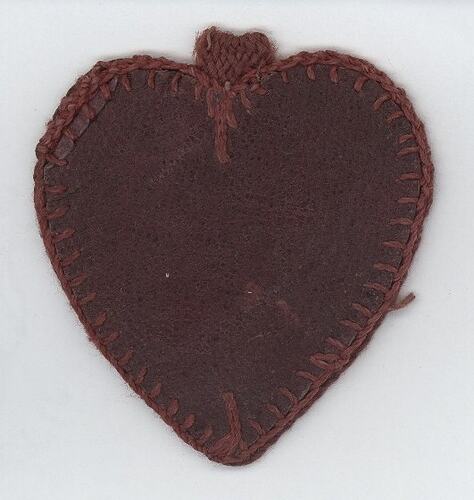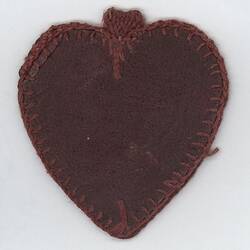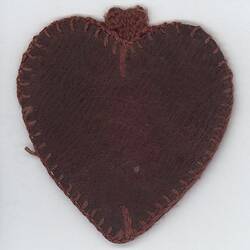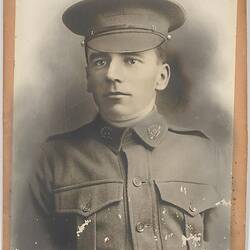Summary
Alternative Name(s): Devotional Scapular, Amulet, Devotional Pouch
Heart-shaped pouch from a collection of objects belonging, to or relating to, Private Albert Edward Kemp, who served in France and Belgium in World War I and was killed in battle in 1917.
Containing two tiny Catholic images, the pouch may have been made by his wife Annie Kemp, who was a seamstress, for Albert to take to war, although there is no evidence of which family member actually used/carried the pouch.
A similar pouch in the collection of the Australian War Memorial, together with two crucifixes, is described as a Catholic scapular - a symbol of religious devotion. The AWM suggests their example was made as a gift and protective amulet by a loved one, and that the giver, wearer or both were likely devout Catholics.
Albert Edward Kemp was a 32-year-old butcher living in Caulfield and married to Annie Josephine, when he enlisted. He and Annie had a daughter, Ethel Mavis, and a baby son, George Percival. Albert enlisted at Royal Park on 4 October 1916, and was assigned to the 22nd Reinforcements, 6th Battalion - regimental number 6800. His battalion left Melbourne 25 October 1916 - just 21 days after he enlisted. He was shipped to France on 27 March and was taken on strength on 4 April. On 21 September 1917, Albert died in battle at Glencorse Wood, Belgium. His body was never found. He is commemorated at 29 The Ypres (Menin Gate) Memorial, Belgium.
Physical Description
Maroon leather with red blanket-stitched edging. Two cloth pieces inside, one attached, bearing Catholic icons.
Significance
Albert Edward Kemp was a 32-year-old butcher, living at 8 Normanby Ave, Caulfield and married to Annie Josephine, when he enlisted. Born in South Yarra, he was a small man, 5'4½", and weighed only eight stone. He and Annie had a daughter, Ethel Mavis, and a son, George Percival.
Albert enlisted at Royal Park on 4 October 1916, and was assigned to the 22nd Reinforcements, 6th Battalion - regimental number 6800. His battalion left Melbourne 25 October 1916 - just 21 days after Albert enlisted - on the "Ulysses" with two officers and 150 O/Rs. The ship arrived in Plymouth three days after Christmas.
A little over one month later, on 1 February 1917, Albert was disciplined for being absent without leave from midnight and was apprehended the next afternoon. He forfeited 18 days' pay for his offence. He was shipped to France on 27 March, and probably went into action in the trenches. On 13 July Albert was again in trouble, this time for disobeying orders from a superior officer. (It is unclear what his punishment was, but "48 hours" may refer to imprisonment).
Two months later, on 21 September 1917, Albert died in the trenches in Glencorse Wood, Belgium. He is buried at 29 The Ypres (Menin Gate) Memorial, Belgium. His name is located at panel 47 in the Commomorative Area at the Australian War Memorial.
Some time in 1918, Albert's belongings were sent in error to a family who had lost a member by the same name in Wonthaggi, and Annie received that man's belongings. In June she was asked to return the other Pte Kemp's belongings.
Annie received a war pension, but appears to have fallen on hard times - suggested by her need for assistance with a grocery bill approved in one of the documents. She moved to 19 Raleigh St, Malvern in 1922. It is unclear what happened to Ethel, as only George is mentioned from the early 1920s. Further research is required.
The family's home at 8 Normanby Ave is still standing, largely with original façade; their street overall is also largely original.
More Information
-
Collection Names
-
Collecting Areas
-
Acquisition Information
Purchase from Mr Jeff Kemp, 07 Dec 2006
-
Date Made
-
Past Owner
Private Albert E. Kemp - 6th Battalion, Australian Imperial Force (AIF)
Possible owner - Albert was a Catholic, and may have taken this with him to war. -
Classification
-
Category
-
Discipline
-
Type of item
-
Overall Dimensions
6.2 cm (Length), 5.7 cm (Width)
-
Keywords
Death & Mourning, Religions: Roman Catholic, Wars & Conflicts, World War I, 1914-1918, Making History - Kemp Mourning Collection, Soldiers' Comforts, Religious Symbols



